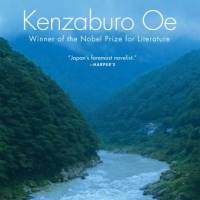Taking its title from T. S. Eliot's "The Waste Land," Oe's strongly autobiographical novel — published in 2009 at the age of 74 — sees his elderly fictional alter ego, Kogito Choko, return to his native Matsuyama, in Ehime Prefecture, to write a long-deferred work (simply known as "The Drowning Novel") about his father's mysterious death in the last days of World War II.
Death by Water, by Kenzaburo Oe, Translated by Deborah Boehm.
432 pages
GROVE PRESS, Fiction.
Kogito's father had been a sympathizer to ultranationalist sentiment and appears to have been involved in a violent plot to frustrate Japan's admission of defeat. This knowledge entices his son — an ardent supporter of postwar democracy — to probe both the psychology of his father and the tormented history of his own nation.
Kogito engages in lengthy conversations with members of a theatrical group attempting to put a condensed version of his entire life's work on the stage. Meanwhile the much-anticipated opening of a red leather trunk, supposedly containing the secrets of his father's demise, is revealed to be disappointingly insubstantial.
Written in dialogue with Oe's own, earlier works on similar subjects — the novella "The Day He Himself Shall Wipe My Tears Away" (1972) is repeatedly referenced — and richly interlaced with meditations on the interactions of dream, memory, myth and perception, this novel is a careful, multilayered contemplation on the methodology and potential of art itself.
Read archived reviews of Japanese classics at jtimes.jp/essential.



















With your current subscription plan you can comment on stories. However, before writing your first comment, please create a display name in the Profile section of your subscriber account page.